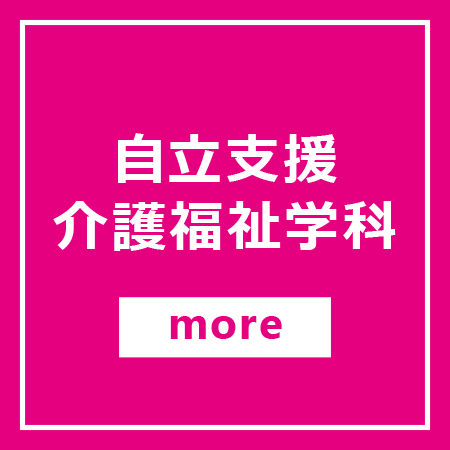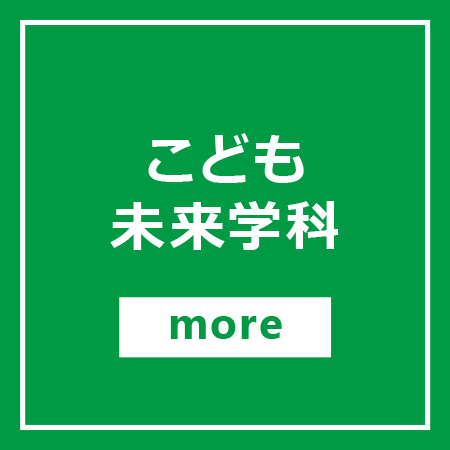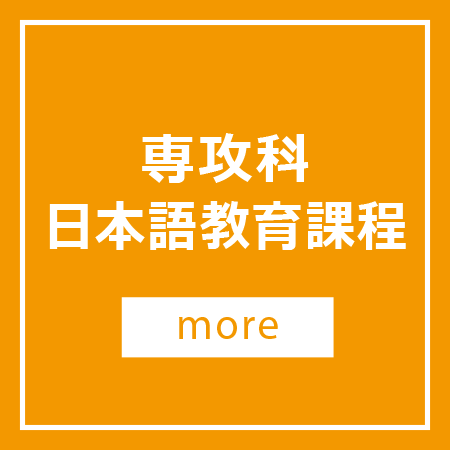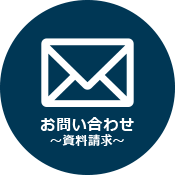01Coaching with small classes and homeroom teacher system.
Detailed instruction in small groups. We grow the compassion that is essential for care workers, nursery teachers and kindergarten teachers. Also, the homeroom teacher system creates close communication between teachers and students. Another great point of our school is the warm school atmosphere where students can relate to each other.
02Excellent instructors who are familiar with the field
Our full-time faculty members are elite, including teachers who have long experience in the field as care workers and are academically certified “Independence Support Care Instructors” and teachers who have long been involved in childcare worker training and have deep connections with the field. We provide theoretical and practical guidance on specialized knowledge, skills, the mindset needed to engage in welfare work and practical work in the field.
03Pressure-free learning with a 5-day week system
Our school has adopted a five-day week system and has created a curriculum that allows students to slowly and steadily develop their skills over the course of two years. We also have long vacations so you can enjoy school events, various training sessions and international exchanges at ease and have a fulfilling student life.
04Abundant training to develop advanced practical skills
In addition to an abundant on-campus training, students will receive 10 weeks of facility training over the course of two years. Places for practical training include special elderly nursing homes, healthcare facilities, nursery schools, kindergartens, child care facilities, and support facilities for people with disabilities. Training location will be made taking into account the student’s wishes and career path. Also, Independence Support and Care Welfare Department will conduct on-site training in social welfare and the Children’s Future Department will also conduct special training at kindergartens and nursery schools of the school group.
05Developing human resources responsive to globalization
Hokuto Academy Group currently has ongoing academic affairs partners in eight countries. In October 2020, we established a specialized Japanese Language Education Course. International students from all over the world are enrolling and the campus is becoming increasingly international. We also offer short-term overseas training in Taiwan, providing an environment where students can acquire an international mindset while enrolled in the school and cultivate human resources who can play an active role on the global stage.
06Fulfilling financial support
In addition to scholarships from the Japan Student Services Organization, there are multiple study funding systems offered by local governments and social welfare corporations in and out of Hokkaido and we’re planning to further expand these programs. There are many students using these scholarships and studying. Also, Independence Support and Care Welfare Department is a designated course under the Education and Training Benefit System and students from a wide range of generations are studying here with a good track record of exchanges and graduations among people with working experience.
The Children’s Future Department aims to become a “kindergarten teacher” or “nursery teacher” in two years. It’s also possible to obtain a junior college graduation qualification by taking correspondence courses from our partner, Toyooka Junior College. Normally, students would need to go to the same college for “schooling” but with the cooperation of the college, it’s possible to take all of the courses while staying at our school. You can gain a lot of experience in childcare and early childhood education, such as practical training and volunteering at kindergartens that are part of the Hokuto Bunka Academy group. Because we are part of the same group, we are able to respond flexibly and we have created an environment where we can provide a high level of practical experience and an easy-to-understand environment regarding actual kindergarteners and on-site responses.


01Independence Support and Care Welfare Department
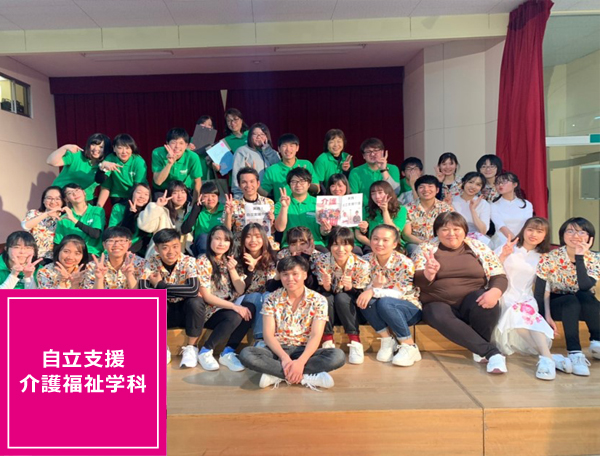
An environment where you can expect hands-on practical classes and higher degrees.
At our school, instructors who have been active in the front lines convey their voices and we also incorporate a wealth of practical training inside and outside the school, including in-home care training to learn practical home care and to develop practical skills as a caseworker. We offer practical training classes that can expand your employment options, such as practical training on social welfare. Also, for practical training at actual facilities, we choose training sites that match the students’ career aspirations, so that they can be fully aware of employment. In addition to classes in which students acquire such skills, we have also developed classes in recent years to help students understand the nursing care system, which has undergone repeated changes in line with the needs of the times and to provide them with the knowledge to think about the whole society. Our school will provide students who are scheduled to enroll by 2013 with qualifications that are essential for working in the field of welfare. Upon graduation, you’ll be able to obtain “Certified Care Worker” and “Qualification for Social Welfare Officer” qualifications.
-
Certified Care Worker
(National Exam Eligibility)
This is an essential qualification for professionals who provide care for the elderly and people with disabilities in their daily lives. We are also in charge of mental-health care and provide advice and guidance to the families of those who require nursing care. The ability to create accurate care plans is also required.
-
Social Welfare Officer
(Appointment Qualifications)
Social Welfare Officers are responsible for providing consultation, guidance and assistance to people who need protection and support in administrative organizations such as prefectures and municipalities. In order to deal with various issues in social life, specialized knowledge regarding welfare administration in general is required.
-
Specialist Title
(Education/Welfare field) (Public announcement by the Minister of Education, Culture, Sports, Science and Technology)
Upon graduation, you will be able to obtain a Specialist Title in the field of education and welfare. Some of the educational subject credits taken at our school may be recognized as credits already taken when enrolling or transferring to a university or junior college.
-
Red Cross First Aid Paramedic
(Certification) (Japanese Red Cross Society)
This qualification is obtained by taking an emergency first aid training course and passing a test. Learn first aid and lifesaving skills and how to deal with unexpected accidents and sudden illnesses. Furthermore, students will develop skills that will enable them to work as volunteers during disasters.
02Children’s Future Department

Children’s Future Department is a 2-year training course for kindergarten teachers and nursery teachers.
Society’s declining birthrate is such an important issue that some say it’s progressing at a serious level. At the same time, our school carries out education keeping in mind that early childhood is an important period related to the foundations of character-building. To achieve this, in addition to the foundation of “family education and child-rearing”, it’s important that “communities” and “facilities such as daycare centers and kindergartens” work together to enhance early childhood education. Our school has a track record of producing many talented individuals from its training school for certified care workers, which began in 1992, and strives for communication while contributing to the local community. Also, we reached to establish the Children’s Future Department in 2009 by listening to the voices and information from the front lines of early childhood education from kindergartens and other groups within our group. Creating a society where women can feel safe raising their children and working is an essential factor in countering the declining birthrate.
~Public Job Training~ (Muroran College of Technology(Mono-Tech-Muroran) Contract Training)
-
Nursery Teacher
(National Qualification)
Required qualifications for working in child welfare facilities such as daycare centers for children. Providing childcare for children with our specialized knowledge and skills, we also provide advice to parents on child-rearing.
-
Class 2 Kindergarten Teacher’s License
(Toyooka Junior College Concurrent Study)
Required qualifications to work as a kindergarten teacher. Kindergarten is legally classified as a school and is an institution that provides early childhood education, so unlike a nursery teacher, a teacher’s license is required.
-
Social Welfare Officer
(Appointment Qualification) (Toyooka Junior College Concurrent Study)
Social Welfare Officers are responsible for providing consultation, guidance and assistance to people who need protection and support in administrative organizations such as prefectures and municipalities. In order to deal with various issues in social life, specialized knowledge regarding welfare administration in general is required.
-
短期大学士
(Toyooka Junior College Concurrent Study)
This is a degree given to those who graduate from a junior college. Due to our educational collaboration with Toyooka Junior College, our students will enroll and graduate from the same junior college.
-
Specialist Title
(Education/Welfare field) (Public announcement by the Minister of Education, Culture, Sports, Science and Technology)
Upon graduation, you will be able to obtain a Specialist Title in the field of education and welfare. Some of the educational subject credits taken at our school may be recognized as credits already taken when enrolling or transferring to a university or junior college.
-
Red Cross First Aid Paramedic
(Certification) (Japanese Red Cross Society)
This qualification is obtained by taking an emergency first aid training course and passing a test. Learn first aid and lifesaving skills and how to deal with unexpected accidents and sudden illnesses. Furthermore, students will develop skills that will enable them to work as volunteers during disasters.
03Japanese Language Education Course

Japanese language education human resources training/Entrusted with development projects such as training curriculum etc.
In October 2020, we established a Japanese Language Education Course at Hokkaido School of Welfare Education as a school notified by the Ministry of Justice. Our school’s headquarters are in Muroran City and it accepts international students from overseas to its affiliated International Cooking School, including the school’s Independence Support and Care Welfare Department. There are two courses (6 months/1 year) of Japanese Language Education Course for international students. There are also Japanese language education programs such as Japanese Language/Japanese Culture Training Courses, Foreign Human Resources Nursing Care Support Project (Japanese Language, Nursing Care skills, etc.). In 2021, we were entrusted by the Agency for Cultural Affairs to carry out the “Japanese Language Education Human Resources Development Project, Training Curriculum, etc.”, and not only in Muroran City, where our school’s headquarters is located, but also, we are working in three cities in the Iburi region including Date City and Tomakomai City and we conducted training to develop Japanese language learning supporters. The Institute will also play a certain role in the preparation, research, planning and public relations activities for such projects. We will continue to be entrusted with the Agency for Cultural Affairs’ projects for two years starting in 2022. As we continue to accept more foreigners, mainly in the Iburi area, we would like to work on training Japanese language learning supporters to help create a multicultural society.




-
Coming Soon


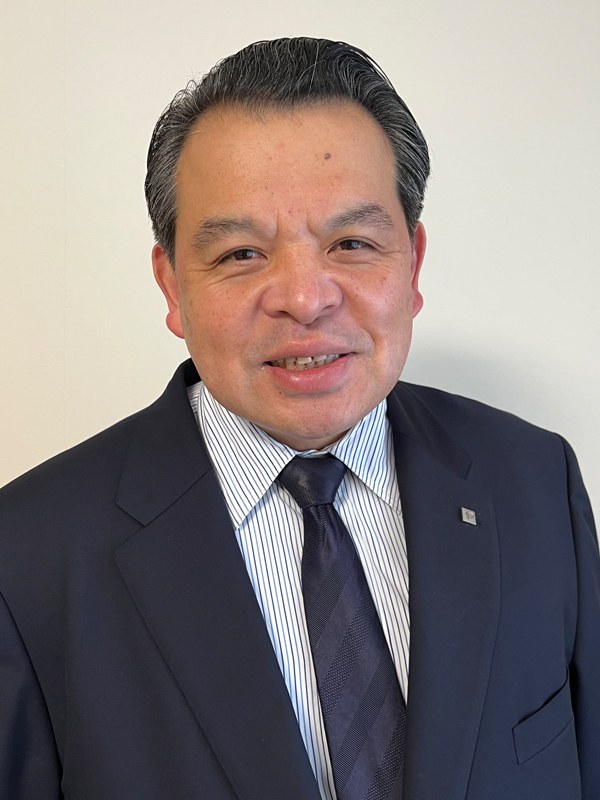
We will develop nursing care and childcare specialists who will be needed in future society.
Hokuto Bunka Academy
International School of Culinary & Arts
Principle Sakimoto Sawada
Since our predecessor school opened in 1941, our school has aimed to provide human education with high values backed by rich humanity and has always strived to develop professional human resources who can contribute to the local community. In April 1992, we established the Care Welfare Department in order to develop human resources to cope with the aging of society and in 2019 we changed the name of the department to Independence Support and Care Welfare Department. Up until the 28th class graduating in March 2021, the employment rate has been 100% for 28 consecutive years. Also, in the “Children’s Future Department”, which was established in 2009 and is a training course for Nursery Teachers and Kindergarten Teachers, for the 11th consecutive year since last year, students who wish to work after graduation have made their wishes come true.
This society is entering an era in which the “baby boomer” generation, who have diverse values and are familiar with the affluent era of post-war high economic growth, will be in serious need of nursing care. At the same time, in today’s society, where there is a need to “secure a working population” in an era of declining birthrates and an aging population, women who leave their children at home and work, as well as women who work in double-income households, need to be considered as human resources who are useful to society in order to maintain the childcare services necessary for double-income households. Furthermore, kindergarten teachers, who are professionals who foster intelligence and humanity in early childhood, which are the most important for human beings, are expected to play an even greater role in society.
As the only vocational school in the Hokkaido Iburi-Hidaka area that offers educational and welfare curriculum, in March 2014, our school was approved “Professional Practical Course” in order to meet the needs of today’s society and pursue even more advanced practical vocational education. In November that year, in order to begin developing human resources who can play an active role in the globalizing international society, we entered into an academic partnership with the prestigious Fooyin University, located in Kaohsiung City, Republic of China (Taiwan). Subsequently, in April 2016, we entered into an academic partnership with “Hinomaru Academy” in Hanoi, Vietnam, and in November that year, also with “Sakhalin College of Service” in Sakhalin, Russia. The partnership is expanding and increasing. Furthermore, in October 2020, we opened a “Japanese Language Education Course” and made a new start as the only Japanese language education institution in the area.
In the future, by actively engaging in exchanges between partner schools, we will be able to contribute to international society based on the basic attitude of understanding the differences between ourselves and others through mutual specialized vocational education and mutually recognizing and respecting these differences and will strive to develop human resources. The attitude of “the other person is me” and “I see myself reflected in the other person” is the key to acquiring the value that “my ultimate joy lies in always creating happiness for others other than myself”. I am convinced that is necessary. This is cultivated through continuous efforts of humanistic education based on the school motto of “Love, Respect, Faith”. We, the faculty and staff, will continue to work as one and practice education that embodies this school philosophy with an attitude of “set an example worth following”.
April 2021



